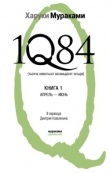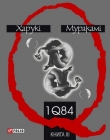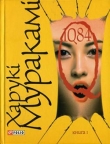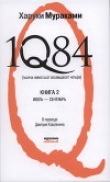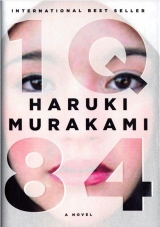
Текст книги "1q84"
Автор книги: Haruki Murakami
Жанр:
Современная проза
сообщить о нарушении
Текущая страница: 60 (всего у книги 81 страниц)
CHAPTER 10
Ushikawa
GATHERING SOLID LEADS
Ushikawa traveled to Ichikawa. It felt like quite a long excursion, but actually Ichikawa was just over the river in Chiba Prefecture, not far from downtown Tokyo. At the station he boarded a cab and gave the driver the name of the elementary school. It was after one p.m. when he arrived at the school. Lunch break was over and classes had just begun for the afternoon. He heard a chorus singing in the music room and a gym class was playing soccer outside. Children were yelling as they chased after the ball.
Ushikawa didn’t have good memories of his own days in elementary school. He wasn’t good at sports, particularly any kind that involved a ball. He was short, a slow runner, had astigmatism, and was uncoordinated. Gym class was a nightmare. His grades in other classes were excellent, though. He was pretty bright and applied himself to his schoolwork (which led to passing the difficult bar exam when he was only twenty-five). But nobody liked him, or respected him. Not being good at sports may have been one reason. And then there was his face. Since he was a child, he had had this big, ugly face, with a misshapen head. His thick lips sagged at the corners and looked as if they were about to drool at any moment, though they never actually did. His hair was frizzy and unruly. These were not the sort of looks to attract others.
In elementary school he hardly ever spoke. He knew he could be eloquent if necessary, but he didn’t have any close friends and never had the opportunity to show others how well spoken he could be. So he always kept his mouth shut. He kept his ears open and listened closely to whatever anyone else had to say, aiming to learn something from everything he heard. This habit eventually became a useful tool. Through this, he discovered a number of important realities, including this one: most people in the world don’t really use their brains to think. And people who don’t think are the ones who don’t listen to others.
At any rate, his elementary school days were not a page of his life that Ushikawa enjoyed reminiscing over. Just thinking that he was about to visit an elementary school depressed him. Despite any differences between Saitama and Chiba prefectures, elementary schools were pretty much alike anywhere you went in Japan. They looked the same and operated on the same principles. Still, Ushikawa insisted on going all the way to visit this school in Ichikawa himself. This was important, something he couldn’t leave up to anyone else. He had called the school’s front office and already had an appointment for one thirty.
The vice principal was a petite woman in her mid-forties, slim, attractive, and nicely dressed. Vice principal? Ushikawa was puzzled. He had never heard that term before. But it was ages ago when he graduated from elementary school. Lots of things must have changed since then. The woman must have dealt with many people over the years, for she didn’t blink an eye when faced with Ushikawa’s extraordinary features. Or perhaps she was just a very well-mannered person. She showed Ushikawa to a tidy reception room and invited him to take a seat. She sat down in the chair across from him and smiled broadly, as if wondering what sort of enjoyable conversation they were about to have.
She reminded Ushikawa of a girl who had been in his class in school. The girl had been pretty, got good grades, was kind and responsible. She was well brought up and good at piano. She was one of the teacher’s favorites. During class Ushikawa spent a lot of time gazing at her, mainly at her back. But he never once talked with her.
“I understand that you’re looking into one of the graduates of our school?” the vice principal asked.
“I’m sorry, I should have given you this before,” Ushikawa said, and passed her his business card. It was the same card he had given Tengo, the one with his title on it: Full-time Director, New Japan Foundation for the Advancement of Scholarship and the Arts. What he told the woman was the same fabricated story he had told Tengo. Tengo Kawana, who had graduated from this school, had become a writer and was on a short list to receive a grant from the foundation. Ushikawa was just running an ordinary background check on him.
“That’s wonderful news,” the vice principal said, beaming. “It’s a great honor for our school, and we will do everything we can to help you.”
“I was hoping to meet and speak directly with the teacher who taught Mr. Kawana,” Ushikawa said.
“I’ll check into that. It’s more than twenty years ago, so she may be retired already.”
“I appreciate that,” Ushikawa said. “If it’s all right, there’s one other thing I would like you to look into, if you would.”
“And what would that be?”
“There was a girl in the same year, I believe, as Mr. Kawana, a Miss Masami Aomame. Would you be able to check into whether she was in the same class as Mr. Kawana?”
The vice principal looked a bit dubious. “Is this Miss Aomame in some way connected with the question of funding for Mr. Kawana?”
“No, it’s not that. In one of the works by Mr. Kawana, there is a character who seems to be modeled on someone like Miss Aomame, and I have a few questions of my own on this topic that I need to clear up. It’s nothing very involved. Basically a formality.”
“I see,” the vice principal said, the corners of her lips rising ever so slightly. “I am sure you understand, however, that in some cases we may not be able to give you information that might touch on a person’s privacy. Grades, for instance, or reports on a pupil’s home environment.”
“Of course, I’m fully aware of that. All we are after is information on whether or not she was actually in the same class as Mr. Kawana. And if she was, I would appreciate it very much if you could give me the name and contact information for the teacher in charge of their class at the time.”
“I understand. That shouldn’t be a problem. Miss Aomame, was it?”
“Correct. It’s written with the characters for green and peas. An uncommon name.”
Ushikawa wrote the name “Masami Aomame” in pen on a page on his pocket notebook and passed the page to the vice principal. She looked at it for a few seconds, then placed it in the pocket of a folder on her desk.
“Could you please wait here for a few minutes? I’ll go check our staff records. I’ll have the person in charge photocopy whatever can be made public.”
“I’m sorry to bother you with this when you are obviously so busy,” Ushikawa said.
The vice principal’s flared skirt swished prettily as she exited the room. She had beautiful posture, and she moved elegantly. Her hairstyle was attractive too. She was clearly aging gracefully. Ushikawa shifted in his seat and killed time by reading a paperback book he had brought along.
The vice principal came back fifteen minutes later, a brown business envelope clutched to her breast.
“It turns out that Mr. Kawana was quite the student. He was always at the top of his class as well as a very successful athlete. He was especially good at arithmetic and mathematics, and even in elementary school he was able to solve high-school-level problems. He won a math contest and was written up in the newspaper as a child prodigy.”
“That’s amazing,” Ushikawa said.
“It’s odd that while he was touted as a math prodigy, today he has distinguished himself in literature.”
“Abundant talent is like a rich vein of water underground that finds all sorts of places to gush forth. Presently he is teaching math while writing novels.”
“I see,” the vice principal said, raising her eyebrows at a lovely angle. “Unlike Tengo, there wasn’t much on Masami Aomame. She transferred to another school in fifth grade. She was taken in by relatives in Adachi Ward in Tokyo and transferred to a school there. She and Tengo Kawana were classmates in third and fourth grades.”
Just as I suspected, Ushikawa thought. There was some connection between the two of them.
“A Miss Ota was in charge of their class then. Toshie Ota. Now she’s teaching at a municipal elementary school in Narashino.”
“If I contact that school, perhaps I will be able to get in touch with her?”
“We have already made the call,” the vice principal said, smiling faintly. “When we explained the situation, she said she would be very pleased to meet with you.”
“I really appreciate that,” Ushikawa said. She wasn’t just a pretty face, he thought, but an efficient administrator, too.
On the back of her business card, the vice principal wrote down the teacher’s name and the phone number of the school, the Tsudanuma elementary school, and handed it to Ushikawa. Ushikawa carefully stashed the card in his billfold.
“I heard that Miss Aomame was raised with some sort of religious background,” Ushikawa said. “We are a bit concerned about this.”
The vice principal frowned, tiny lines forming at the corners of her eyes. The kind of subtle, charming, intelligent lines acquired only by middle-aged women who have taken great care to train themselves.
“I’m sorry, but that is not a subject we can discuss here,” she said.
“It touches on areas of personal privacy, doesn’t it,” Ushikawa asked.
“That’s correct. Especially issues dealing with religion.”
“But if I meet with this Miss Ota, I might be able to ask her about this.”
The vice principal inclined her slender jaw slightly to the left and smiled meaningfully. “If Miss Ota wishes to speak as a private individual, that is no concern of ours.”
Ushikawa stood up and politely thanked her. She handed him the brown business envelope. “The materials we could copy are inside. Documents pertaining to Mr. Kawana. There’s a little bit, too, concerning Miss Aomame. I hope it’s helpful to you.”
“I’m sure it will be. Thank you very much for all you have done. You’ve been very kind.”
“When the results of that grant are decided, you’ll be sure to let us know, won’t you? This will be a great honor for our school.”
“I’m positive there will be a good outcome,” Ushikawa said. “I have met him a number of times and he is a talented young man with a promising future.” Ushikawa stopped at a diner in front of Ichikawa Station, ate a simple lunch, and looked through the material in the envelope. There was a basic record of attendance at the school for both Tengo and Aomame, as well as records of awards given to Tengo for his achievements in academics and sports. He did indeed seem to be an extraordinary student. He probably never once thought of school as a nightmare. There was also a copy of a newspaper article about the math contest he had won. It was an old article and the photo wasn’t very clear, but it was obviously Tengo as a boy.
After lunch Ushikawa phoned the Tsudanuma elementary school. He spoke with Miss Ota, the teacher, and made an appointment to meet her at four at her school. After four I’m free to talk, she had said.
I know it’s my job, Ushikawa sighed, but two elementary schools in one day is a bit much. Just thinking about it made him depressed. But so far it had been worth the effort. He now had proof that Tengo and Aomame were classmates for two years—a huge step forward.
Tengo had helped Eriko Fukada to revise Air Chrysalis into a decent novel, and make it a bestseller. Aomame had secretly murdered Eriko’s father, Tamotsu Fukada, in a suite at the Hotel Okura. It would appear that they shared the goal of attacking, in their own ways, the religious organization Sakigake. Perhaps they were working together. That’s what most people would conclude.
But it wouldn’t do to tell that duo from Sakigake about this—not yet. Ushikawa didn’t like to reveal information in fits and starts. He much preferred gathering as much information as he could, making absolutely sure of all the facts, and then, when he had solid proof, revealing the results with a flourish. It was a theatrical gesture he still retained from his days as a lawyer. He would act self-deprecating so that other people would let down their guard. Then, just when things were drawing to a conclusion, he would bring forth his irrefutable evidence and turn the tables.
As he rode the train to Tsudanuma, Ushikawa mentally assembled a number of hypotheses.
Tengo and Aomame might be lovers. They wouldn’t have been lovers when they were ten, of course, but it was possible to see them, after they graduated from elementary school, running into each other and growing intimate. And for some reason—the reason was still unclear—they decided to work together to destroy Sakigake. This was one hypothesis.
As far as Ushikawa could tell, however, there was no evidence of Tengo and Aomame having a relationship. Tengo had maintained an ongoing affair with a married woman ten years older than himself. If Tengo had been deeply involved with Aomame, he would not then regularly cheat on her with another woman—he wasn’t adroit enough to pull that off. Ushikawa had previously investigated Tengo’s habits over a two-week period. He taught math at a cram school three days a week, and on the other days he was mostly alone in his apartment. Writing novels, most likely. Other than occasionally shopping or going for a walk, he seldom left his place. It was a very monotonous, simple lifestyle, easy to fathom. There was nothing mysterious about it. Somehow Ushikawa just couldn’t picture him involved in a plot that involved murdering someone.
Personally, Ushikawa liked Tengo. Tengo was an unaffected, straightforward young man, independent and self-reliant. As is often the case with physically large people, he tended to be a bit slow on the uptake at times, but he wasn’t sly or cunning in the least. He was the kind of guy who, once he decided on a course of action, never deviated from it. The kind who would never make it as a lawyer or a stockbroker. Rather, he was more likely to get tripped up and stumble at the most critical juncture. He would make a good math teacher and novelist, though. He wasn’t particularly sociable or eloquent, but he did appeal to a certain type of woman. In a nutshell, he was the polar opposite of Ushikawa.
In contrast to what he knew about Tengo, Ushikawa knew next to nothing about Aomame—other than her background with the Witnesses and that she had later been a star softball player. When it came to her personality—her way of thinking, her strong points and weaknesses, what sort of private life she led—he was clueless. The facts that he had assembled were nothing more than what you would find on a résumé.
But while comparing the backgrounds of Tengo and Aomame, some similarities came to light. First of all, both of them must have had unhappy childhoods. Aomame was dragged all over town by her mother to proselytize, slogging from house to house, ringing doorbells. All the Witness children were made to do that. In Tengo’s case, his father was an NHK fee collector. This was another job that involved making the rounds from one house to the next. Had Tengo been dragged along with him? Maybe he had. If Ushikawa had been Tengo’s father, he probably would have taken Tengo with him on his rounds. Having a child with you helped you collect more fees, and you saved on babysitting money—two birds with one stone. For Tengo this couldn’t have been much fun. Perhaps these two children even passed each other on the streets of Ichikawa.
Second, as they grew older, Tengo and Aomame worked hard to win athletic scholarships so they could get far away from home as quickly as possible. And both of them turned out to be superb athletes. They both must have been pretty talented to begin with. But there was also a reason they had to be superb. Being an athlete was a way to be recognized by others, and having outstanding records in sports was just about the only way they could win their independence. This was the valuable ticket they needed to survive. They thought differently from average teenagers. They confronted the world differently.
When he thought about it, Ushikawa realized his own situation somewhat resembled theirs.
I’m from an affluent family and had no need to get a scholarship. I always had plenty of spending money. But in order to get into a top university, and pass the bar exam, I had to study like mad, just like Tengo and Aomame. I had no time to have fun like my classmates. I had to abstain from all worldly pleasures—not that I had much chance of obtaining them to begin with—and focus solely on my studies. I was always stuck between feelings of inferiority and superiority. I often used to think I was like Raskolnikov, except I never met Sonia.
Enough about me. Thinking about that won’t change anything. I have to get back to Tengo and Aomame.
Say Tengo and Aomame did happen to run across each other sometime in their twenties and started talking. They would have been so amazed at all the things they had in common. And there would be so many things they had to talk about. Maybe they found themselves attracted to each other, as a man and a woman. Ushikawa had a vivid mental image of this scene—a fateful meeting, the ultimate romantic moment.
But had such a meeting actually taken place? Had a romance blossomed? Ushikawa didn’t know. But it would make sense if they had actually met. That would explain how they joined forces to attack Sakigake, each of them from a different angle—Tengo with his pen, Aomame no doubt with some special skill she had. Somehow, though, Ushikawa couldn’t warm to this hypothesis. On one level it all made sense, but he wasn’t convinced.
If indeed Tengo and Aomame did have such a deep relationship, there would be evidence. This fateful meeting would have had fateful results, and this would not have passed unnoticed by Ushikawa’s observant eyes. Aomame might have been able to hide it, but not Tengo.
In general, Ushikawa saw things logically. Without proof, he couldn’t go forward. However, he also trusted his natural intuition. When it came to a scenario where Tengo and Aomame had conspired together, his intuition shook its head no. It was just a little shake, but insistent nonetheless. Maybe the two of them weren’t even aware of each other’s existence. Maybe it just turned out that they were both simultaneously involved with Sakigake.
Even if it was hard to picture such a coincidence, Ushikawa’s intuition told him that this hypothesis felt more likely than the conspiracy theory. The two of them, driven by different motives, and approaching things from different angles, just happened to simultaneously shake Sakigake to the core. Two story lines at work, with different starting points but running parallel to each other.
The question was, would the Sakigake twosome accept such a convenient hypothesis? No way, Ushikawa concluded. Instead, they would jump at the conspiracy theory, for they loved anything that hinted of sinister plots. Before he handed over any raw information, he needed solid proof. Otherwise they would be misled and it might wind up hurting him.
As Ushikawa rode the train from Ichikawa to Tsudanuma, he pondered all this. Without realizing it, he must have been frowning, sighing, and glaring into space, because an elementary-school girl in the seat across from him was looking at him oddly. To cover his embarrassment, he relaxed his expression and rubbed his balding head. But this gesture only ended up making the little girl frightened, and just before Nishi-Funabashi Station, she leapt to her feet and rushed away.
He spoke with Toshie Ota in her classroom after school. She looked to be in her mid-fifties. Her appearance was the polar opposite of the refined vice principal back at the Ichikawa elementary school. Miss Ota was short and stocky and, from behind, had a weird sort of gait, like a crustacean. She wore tiny metal-framed glasses, but the space between her eyebrows was flat and broad and you could clearly see the downy hair growing there. She had on a wool suit of indeterminate age, though no doubt it was already out of fashion by the time it was manufactured, and it carried with it a faint odor of mothballs. The suit was pink, but an odd sort of pink, like some other color had been accidentally mixed in. They had probably been aiming for a classy, subdued sort of hue, but because they didn’t get it right, the pink of her suit sank deeply back into diffidence, concealment, and resignation. Thanks to this, the brand-new white blouse peeking out of the collar looked like some indiscreet person who had wandered into a wake. Her dry hair, with some white strands mixed in, was pinned back with a plastic clip, probably the nearest thing she had had on hand. Her limbs were on the beefy side, and she wore no rings on her stubby fingers. There were three thin wrinkles at her neckline, sharply etched, like notches on the road of life. Or maybe they were marks to commemorate when three wishes had come true—though Ushikawa had serious doubts that this had ever happened.
The woman had been Tengo Kawana’s homeroom teacher from third grade until he graduated from elementary school. Teachers changed classes every two years, but in this case she had happened to be in charge of his class for all four. Aomame was in her class in only third and fourth grades.
“I remember Mr. Kawana very well,” she said.
In contrast to her gentle-looking exterior, her voice was strikingly clear and youthful. It was the kind of voice that would pierce the farthest reaches of a noisy classroom. Your profession really molds you, Ushikawa thought, impressed, sure that she must be a most capable teacher.
“Mr. Kawana was an outstanding pupil in every area of school. I have taught countless students in a number of schools, for over twenty-five years, yet I have never run across a student as brilliant as he was. He outdid everyone in anything he tried. He was quite personable and had strong leadership qualities. I knew he could make it in any field he chose. In elementary school he particularly stood out in arithmetic and math, but I wasn’t so surprised to hear that he has been a success in literature.”
“I understand that his father was an NHK fee collector.”
“Yes, that’s right,” the teacher said.
“Mr. Kawana told me that his father was quite strict,” Ushikawa said. This was just a shot in the dark.
“Exactly so,” she said, without hesitating. “His father did have a strict way about him. He was proud of his work—a wonderful thing—but this seemed to be a burden at times for Tengo.”
Ushikawa had skillfully tied topics together and teased out the details from her. This was his forte—to let the other person do the talking, as much as possible. Tengo hated having to tag along with his father on his rounds on the weekend, she told him, and in fifth grade he ran away from home. “It was more like he was kicked out rather than ran away,” she explained. So Tengo had been forced to go with his father to collect the fees, Ushikawa mused. And—just as he thought—this must have taken an emotional toll on the boy.
Miss Ota had taken the temporarily homeless Tengo into her home for the night. She prepared a bed for him, and made sure he ate breakfast the next morning. That evening she went to Tengo’s house and convinced his father to take him back. From the way she talked about this event, you would have thought it was the highlight of her entire life. She told him too about how they happened to run into each other again at a concert when Tengo was in high school. Tengo had played the timpani, wonderfully, she added.
“It was Janáček’s Sinfonietta. Not an easy piece, by any means. Tengo had first taken up the timpani only a few weeks before. But even with such little preparation he played his part beautifully. It was miraculous.”
This lady has deep feelings for Tengo, Ushikawa thought admiringly. Almost a kind of unconditional love. What would it feel like to be loved that deeply by someone else?
“Do you remember Masami Aomame?” Ushikawa asked.
“I remember her very well,” the teacher replied. But her voice wasn’t as happy as when she had talked about Tengo. The tone of her voice had dropped two notches on the scale.
“Quite an unusual name, isn’t it?” Ushikawa said.
“Yes, very unusual. But I don’t remember her just because of her name.”
A short silence followed.
“I heard her family were devout members of the Witnesses,” Ushikawa said, sounding her out.
“Could you keep this between just the two of us?” the teacher asked.
“Of course. I won’t repeat it to anyone.”
The woman nodded. “There is a large branch office of the religion in Ichikawa, so I have had several children from the Witnesses in my class over the years. As a teacher this led to some delicate problems I had to address. But no one was as devout as Miss Aomame’s parents.”
“In other words, they were uncompromising.”
As if recalling the time, the teacher bit her lip. “Exactly. When it came to their principles they were extremely firm, and I think they sought the same strict obedience from their children. This made Miss Aomame quite isolated in the class.”
“So in a sense she was someone rather special.”
“She was,” the teacher admitted. “But you can’t blame the child for this. Responsibility for it lies in the intolerance that can take over a person’s mind.”
The teacher explained more about Aomame. Generally the other children just ignored her. They tried to treat her as if she wasn’t there. She was a foreign element, brandishing strange principles that bothered others. The class was all in agreement on this. Aomame reacted by keeping a low profile.
“I tried to do my best, but children’s unity is stronger than you might think, and the way Miss Aomame reacted to this was to transform herself into something close to a ghost. Nowadays we would have referred her to counseling, but such a system wasn’t in place back then. I was still young, and it took all I had to get everybody in the class on the same page. Though I’m sure that sounds like I’m trying to excuse myself.”
Ushikawa could understand what she was getting at. Being an elementary school teacher was hard work. To a certain extent, you had to let the children figure out things on their own.
“There is always just a thin line separating deep faith from intolerance,” Ushikawa said. “And it’s very hard for people to do anything about it.”
“Absolutely,” the woman said. “But still, at a different level there should have been something I could do. I tried talking with Miss Aomame any number of times, but she would barely respond. She had a very strong will, and once she was set on something she wouldn’t change her mind. She was quite bright, very quick-witted, with a strong desire to learn. But she tried hard to suppress any of that, to keep it from showing. Probably not standing out was her only way of protecting herself. I’m sure if she had been living in a normal environment she would have been an outstanding pupil. I feel really bad looking back on it now.”
“Did you ever speak with her parents?”
The teacher nodded. “Many times. Her parents came to school to complain about religious persecution. When they did, I asked them to try to make more of an effort to help their daughter fit in to the class. I asked if they could bend their principles just a little. They refused point-blank. Their top priority was keeping true to the rules of their faith. To them the highest happiness lay in going to heaven, and life in this profane world was merely transient. But this was the logic of an adult worldview. Unfortunately, I could never get them to see how much pain it was causing their young daughter to be ignored in class, shunned by the other children—how this would lead to an emotional wound that might never heal.”
Ushikawa told her how Aomame was a leading softball player on teams in college and in a company, and how she was working as a very capable fitness instructor in a high-class sports club. Or rather, had been working until recently, he should have said, but he didn’t insist on making the distinction.
“I’m very glad to hear that,” the woman said. She blushed slightly. “I’m so relieved to hear that she grew up all right, and is healthy and independent now.”
“There was one thing, though, that I wasn’t able to find out,” Ushikawa said, a seemingly innocent smile rising to his lips. “Do you think it was possible that Tengo Kawana and Miss Aomame had a close personal relationship?”
The woman teacher linked her fingers together and thought about this. “That may have been possible. But I never saw it myself, or heard about it. I find it hard to picture any child in that class ever being really friendly with Miss Aomame. Perhaps Tengo did reach out to her. He was a very kind, responsible sort of boy. But even supposing it did happen, Miss Aomame wouldn’t have opened up that easily. She was like an oyster stuck on a rock. It can’t easily be pried open.”
The teacher stopped for a moment, and then added, “It pains me to have to put it this way, but there was nothing I could do at the time. As I said before, I was inexperienced and not very effective.”
“If Mr. Kawana and Miss Aomame did have a close relationship, that would have caused quite a sensation in class, and you would have heard of it. Am I right?”
The teacher nodded. “There was intolerance on both sides.”
“It has been very helpful to be able to talk with you,” Ushikawa said, thanking her.
“I hope what I’ve said about Miss Aomame won’t become an obstacle in awarding the grant,” the teacher said worriedly. “As the teacher in charge of the class I had ultimate responsibility for problems like that arising in the classroom. It wasn’t the fault of either Tengo or Miss Aomame.”
Ushikawa shook his head. “Please don’t worry about that. I’m merely checking the background behind a work of fiction. Religious issues, as I’m sure you know, can be very complicated. Mr. Kawana is a major talent, and I know he will soon make a name for himself.”
Hearing this, the teacher gave a satisfied smile. Something in her small eyes caught the sunlight and glistened, like a glacier on the faraway face of a mountain. She is remembering Tengo when he was a boy, Ushikawa surmised. It was twenty-some years ago, but for her it was like yesterday.


